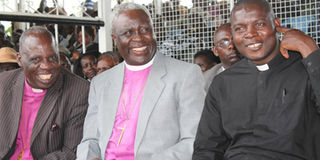Women bishops are ‘accepted’ in Kenya

PHOTO | ISAAC WALE From left: Bishops Simon Oketch, Bishop Beneah Salala and Philip Sulumeti during an education empowerment function in Kakamega town in the past.
What you need to know:
- Mother church in England lagging behind
- In recent years, women have contested to become bishops in Kirinyaga and Mumias dioceses, but they have always been unsuccessful.
The Anglican Church in Kenya is ahead of its mother church in England, which voted to allow women to become bishops for the first time only on Monday.
In recent years, women have contested to become bishops in Kirinyaga and Mumias dioceses, but they have always been unsuccessful.
Speaking in his personal capacity, ACK Mumias Bishop Beneah Salala said women were suited to become bishops as long as they had the calling, ability and were of good standing.
“Apostle Paul in the book of Acts says there is no man or woman when it comes to serving God. During my election, I was competing against a woman, so there is no problem women holding senior positions”, Bishop Salala said in an interview.
The holder of the position of the Provincial Secretary — the top administrator in ACK — is Mrs Rosemary Mbogo, who also doubles up as assistant to Archbishop Eliud Wabukala. Her position is equivalent to that of a bishop.
Mrs Mbogo, who is also the chairperson of the National Council of Churches of Kenya (NCCK) may be the first ACK woman bishop in East Africa if she contests and wins in elections for the Embu bishopric seat coming up before the end of the year.
The head of the diocese, Bishop Henry Kathii, is said to have attained retirement age and will leave by the end of the year.
When contacted for a comment regarding the vote by the General synod of the Church of England, Mrs Mbogo referred us to Archbishop Wabukala whose telephone number went unanswered.
“I’m leading a team in Kaimosi. I would rather not comment now,” she said by SMS.
On Monday, The General Synod of the Church of England, by a two-thirds majority, gave a final approval to legislation introducing the change to allow women to become bishops.
A vote in 2012 was backed by the houses of Bishops and Clergy but blocked by traditionalist lay members.





